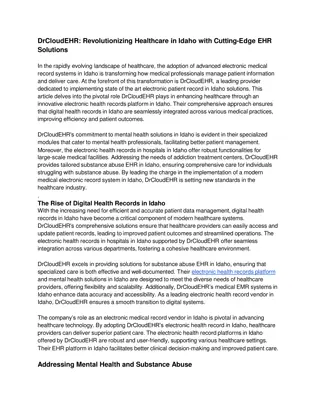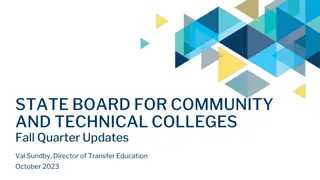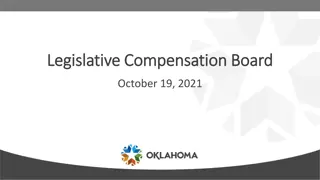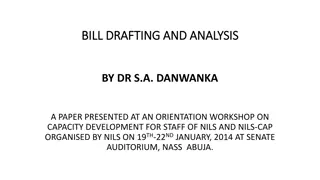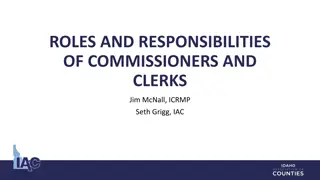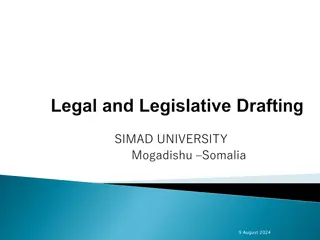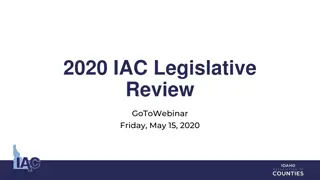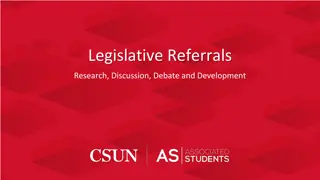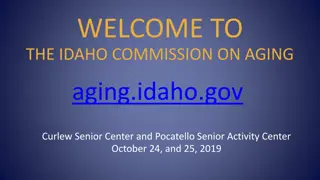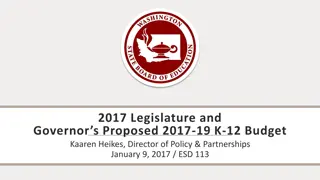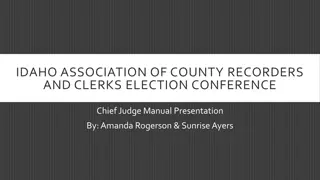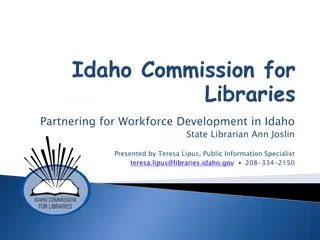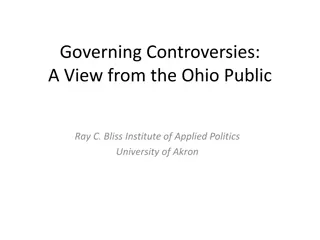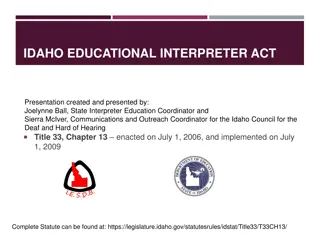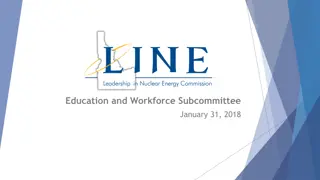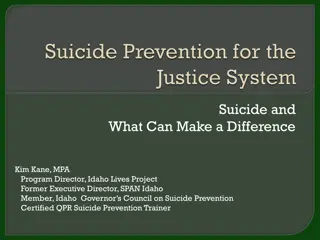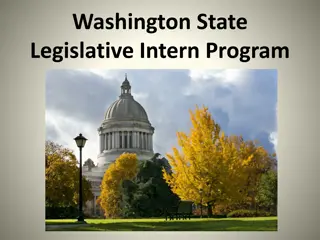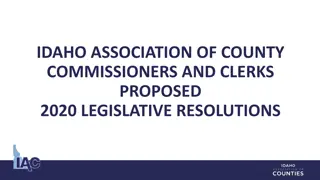Idaho Department of Education - Legislative Initiatives Overview
Idaho Department of Education is addressing funding gaps, introducing weighted per-student discretionary funding, outcomes-based funding, graduation requirement alignment, and promoting fiscal reporting transparency. Various legislative intents aim to enhance education funding, student support, and accountability.
Download Presentation

Please find below an Image/Link to download the presentation.
The content on the website is provided AS IS for your information and personal use only. It may not be sold, licensed, or shared on other websites without obtaining consent from the author. Download presentation by click this link. If you encounter any issues during the download, it is possible that the publisher has removed the file from their server.
E N D
Presentation Transcript
Idaho Department of Education Post- Legislative Tour 2024
Supplemental Request for 2024 Legislative Intent Address the funding gap created in the transition between 2023 enrollment-based funding and returning to seat-time funding in 2024 in order to access HB 1 ($330m). Key Impact $105m to schools in 2024 via discretionary $20m granted to the Career Ready Schools Grant $20m additional funding to H292 distributions Additional monies to discretionary, if gap is more than $145m 2
Weighted, Per-Student Discretionary (Stalled in House at Introduction) Legislative Intent A policy bill for distributing discretionary funds based on student characteristics. Fix for Enrollment/ADA shift. Key Impact $382m in discretionary distributions Close $46m of the +$145m gap (enrollment to seat-time) Focus on a base student amount with stacking weights: 2x Special Education 1x small school (<800) 1x at-risk student 0.25x ELL 0.25x economically disadvantaged 3
Outcomes-Based Funding (Died in Senate Ed) Legislative Intent Provide an additional $40m, via grades 5-8 math and secondary outcomes. Would look similar to the existing early literacy distribution in Idaho code. Key Impact $24m to growth and proficiency in grades 5-8 math $16m focused on secondary outcomes It s a distribution for math and college and career readiness initiatives at the local level 4
Graduation Requirements Why Alignment to what we want students to know and do. The graduation requirements reflect a landscape before A.O., CTE, Apprenticeships, or current educational needs and haven't been comprehensively reviewed in 12 years. What The Idaho Department of Education is working through spring and summer to make recommendations to State Board on updates. There will be direct outreach to all interested parties in the coming weeks and months (survey and website) Process State Board sets graduation requirements in administrative rule, which are approved by the Legislature in the session following the rulemaking process. With legislative approval, these rules have full force of law. 5
Fiscal Reporting Why There are continued efforts to increase local budget transparency. Rather than require this in law, the Idaho Department of Education will help districts and charter schools proactively report this information to parents and the wider community. Plan The Idaho Department of Education will create a template for LEAs to use to self-report this additional data as a cover page on their local budgets and on websites. The data points will include: Total amount expended the previous year. Ratio of administrators to teachers to students. The amount an LEA holds in reserve funds. 6
Student Teacher Pay (No traction - lost in budget shuffle) Idaho Department of Education Intent Request additional money to local education agencies (LEAs) for a stipend to be provided directly to their student teacher, with a sliding scale, between $3,000 to $7,000 per student teacher, with higher distributions going to rural and remote LEAs and underserved school populations. Key Impact Factor for recruitment to decrease the financial burdens associated with student teaching in rural and remote schools around Idaho. Assist rural and remote districts with recruiting student teachers to their schools. 7
H521: Facilities Bill Sponsors Rep. Monks, Speaker Moyle & Sen. Ricks (+40 more), Governor priority Legislative Intent New money for deferred maintenance and/or new construction Key Impact 33-911 is H292 dollars: Lotto and maint. match rolled in Annual allocation - must be spent like H292 dollars 33-917 is new construction/deferred maint. dollars $1b: Must bond for the amount May receive in a lump sum, available later next year 8
H766: Trailer to H521 (Facilities) Bill Sponsors Reps Yamamoto & Rep Clow & Senator Lent Legislative Intent Address concerns and make correction* Key Impact*Restores public charter school facility funds to rates prior to unanticipated reductions created by the passage of HB 292 (2023) Eliminates the state requirement for teacher contract days, allows districts to meet state required hours OR days, provides the state board flexibility to phase in hours or days requirements, and delays implementation to 2025 to ensure legislative oversight of board decisions. 9
FY 2025 K-12 Budget Highlights Overview 3.9% state funds increase ($110.6 million) Appropriation based on 16,154 support units (FY 24 appropriation based on 16,850 support units) Maintenance Budget Set January 16 FY 24 appropriation 1% CEC placeholder (admin and classified base) Standard intent language 10
FY 2025 Standard Intent Language Technology "Moneys so distributed shall be used to implement and operate a learning management system of each school district's or public charter school's choice. A learning management system shall include integration with a school district's or public charter school's student information system (SIS) and shall administer, monitor, and document student and classroom levels of learning. The State Department of Education shall verify that school districts and public charter schools are using funds to purchase a learning management system that is compliant with these standards." 11
FY 2025 Standard Intent Language Instructional and Pupil Service Staff Compensation "In addition to the distribution criteria set forth in Section 33-1004B(9)(f), Idaho Code, an additional $6,359 shall be allocated to each cell for residential, professional, and advanced professional rungs. These funds must be used for instructional and pupil service compensation....The State Department of Education shall provide a report to the Joint Finance-Appropriations Committee by January 13, 2025 on the allocations made by school districts and public charter schools. The format of the report and the contents therein shall be determined by the Legislative Services Office Budget and Policy Analysis Division." 12
FY 2025 K-12 Budget Highlights Enhancement Budget Set March 22 Additional 2% CEC (admin and classified base) Nondiscretionary/statutory adjustments Transportation, career ladder, salary-based apportionment Discretionary funding $3,935 increase in general discretionary ($23,472 per SU) -$1,704 decrease in health insurance ($20,150 per SU) = net increase of $2,231 $43,622 total per SU Line items proposed to be rolled into discretionary funding through weighted per student model remain: Safe and Drug Free Schools, College and Career Advisors, Professional Development, Content and Curriculum, English Language Learners, and Math and Science Requirement 13
FY 2025 Original Appropriation FY 2024 Original Approp. FY 2025 Original Appropriation Change from 2024 Orig. Approp. FY 2025 Original Appropriation PUBLIC SCHOOLS SUPPORT PROGRAM Fund Sources FY 2025 JFAC Action (Legislation) General Fund $2,698,842,500 $2,651,908,900 ($46,933,600) Dedicated Funds $126,498,300 $284,030,400 $157,532,100 State Funds $2,825,340,800 $2,935,939,300 $100,598,500 $557,501,200 $351,105,500 ($206,395,700) Federal Funds Total Appropriation $3,382,842,000 $3,287,044,800 ($95,797,200) State Funds Percent Change: 3.9% Total Funds Percent Change: (2.8%) $329,203,100 $379,168,000 $49,964,900 II. State Discretionary Funds $368,246,900 $325,503,100 ($42,743,800) III. Health Insurance Funds 16,850 16,154 (696) IV. Estimated Support Units (Best 28 Weeks) $19,537 $23,472 $3,935 V. State Discretionary $ Per Support Unit 14 $21,854 $20,150 ($1,704) VI. State Health Insur. $ Per Support Unit
FY 2025 K-12 Budget Highlights Enhancement Budget Facilities $1 billion in state issued bonds not included in this budget (continuously appropriated) $202,978,700 for School District Facilities Fund (H292) Bond Levy Equalization and Facilities Maintenance Match discontinued Lottery funding put toward School District Facilities Fund Charter school facilities: $400 per attending student 15
FY 2025 K-12 Budget Highlights Enhancement Budget COVID funding $100 million in spending authority for remaining ESSER III and Homeless Children and Youth funding September 30, 2024 obligation deadline Idaho Digital Learning Academy Moved to separate division Funding formula updated $430 per enrollment 16
FY 2025 New Intent Language Open Enrollment Information "The State Department of Education shall withhold the November payment for any school district that is not in compliance with the provisions of Section 33-1409, Idaho Code, until such time that a school district becomes compliant." Digital Content "$1,600,000 shall be distributed by the State Department of Education to school districts and public charter schools to purchase digital content and curricula of their choice. Funding will be distributed subject to Section 33-4804(2), Idaho Code." 17
FY 2025 Department Budget Highlights Programs $350,000 for suicide prevention/behavioral health support $302,000 for one-time underperforming charter schools support $20 million for Career Ready Students grant program Spending authority for Professional Standards Commission Spending authority to administer remaining COVID funding Positions Auditor: help verify data that drives funding distributions Regional Director: support northern part of the state Half-time position for underperforming charter school support 18
Q & A 19
Lunch 20
Afternoon 21
Legislative Process 101 Citizen Legislators Our 105 Senators & Representatives are citizen-legislators, all serving 2-year terms. "They are farmers and ranchers, business men and women, lawyers, doctors, sales people, loggers, teachers." 7 Constitutional officers are paid positions and elected to 4-year terms (a plural executive). Each state government's legislature and executive branch is structured differently 22
Legislative Process 101 Legislative Services Office (LSO) Process All legislation and budgets are drafted by non-partisan staff who support the Legislature during the session. All legislation must go through this drafting process. LSO is comprised of four different offices: Budget and Policy Analysis; Information Technology; Legislative Audits; and Research and Legislation. Idaho Department of Education's finance team works closely with LSO staff on the budget for K-12 and Idaho Department of Education. 23
Legislative Process 101 Routing Slip (RS) Draft legislation is created and put into an RS form by LSO staff. An RS is introduced in an initial committee hearing, called a print hearing. If the committee approves the introduction, this RS gets a bill number and a potential full committee hearing. A bill is getting an assigned number based on order and which body (i.e., House or Senate) introduces the bill. 24
Legislative Process 101 Germane Committee There are 15 House standing committees and 10 Senate standing committees. Committees are the policy "workhorses" of the Legislature. For education policy, there are two "germane committees": House Education and Senate Education Committees. Education policy bills are introduced and receive full hearings in these committees. Privileged committees in the House and Senate that have special status during the session, especially toward the end. 25
Legislative Process 101 The Path of a Bill 1. LSO 2. Routing slip 3. Germane committee (House or Senate) 4. Floor (House or Senate) 5. Germane committee (House or Senate) 6. Floor (House or Senate) 7. Governor Revenue measures must originate in the House. 26
Legislative Process 101 Floor Debate The reality of 36 to 18 to 1. o Constructing a bill to make it all of the way. 27
Legislative Process 101 Governor's Office If the Governor vetoes a bill, it can become law if the veto is overridden by a two-thirds majority of those present in each house. A bill can also become law without the Governor s signature if it is not vetoed within five days (Sundays excepted) after presentation to the Governor. After the Legislature adjourns sine die, the Governor has ten days to veto or sign a bill. 28
Legislative Process 101 Sausage-Making 105 personalities, agenda and constituent representations Lobbyists & agencies The Art of Compromise Christmas tree bills o Single subject requirement in Idaho Constitution A good bill , is a good start H 521 and H 415 as examples of this process. Weighted Per Student and OBF Process in 2024. 29
H422: Charter Recodification Bill Sponsors Rep. Judy Boyle & Sen. Lori Den Hartog Legislative Intent Update charter school codification to make duplication of successful charter schools easier, while reducing the reporting for charter schools meeting their performance certificate. Key Impact Reduce charter-related reporting, for high-performing schools Offer additional supports to underperforming charter schools Use performance certificate as reporting measures 30
S1358: Empowering Parents Bill Sponsors Rep. Horman & Sen. Hartog Legislative Intent Include recommendations for this summer's Empowering Parents Parent Advisory Panel (chaired by Supt. Critchfield) that require updates to law. Key Impact Clarifies that students in school districts and public charter schools are eligible to use the micro-grants for programs offered through their schools that have an associated fee. Allows internet expenses to be subject to reimbursement instead of direct payment through the grant distribution platform. Increases the allowable timeframe to expend the funds from 2 to 3 years. 31
S1359: Advanced Opportunities Bill Sponsors Sen. Ben Toews, Sen. Lori Den Hartog, & Rep. Wendy Horman Legislative Intent Increase A.O. $500 for public school students & non-public school students by $1,750 Key Impact Public school student: From $4,125 to $4,625 Non - public school student: From $750 to $2,500 Modifies the payment structure to allow Idaho Department of Education pay the Idaho higher education institutions directly 32
H566: IRI Exemptions Bill Sponsors Rep. Sonia Galaviz & Sen. Carrie Semmelroth Legislative Intent Provide the option of exempting LEP1/LEP2 students from IRI reduce false negatives. Key Impact LEP1/LEP2 students only (state vs federal requirements) Decide ahead of time, if the student will take the IRI 33
H581: Restrain/Seclusion Amendment Bill Sponsors Rep. Marco Erickson & Rep. Lori McCann Legislative Intent Update H581 to clarify escort in relationship to restraint and seclusion. Key Impact "Physical escort : temporary touching or holding of the hand, wrist, arm, shoulder, or back for the purpose of directing a student to a safe location. may be used to remove a student from the classroom behavior is severely disrupting the learning of other students as part of the IEP 34
H645: Trustee Quorum Bill Sponsor Representative Mark Sauter Legislative Intent Ensures the transaction of business can still occur when one or more vacancies exist on a board of trustees if a majority of remaining members of the board are present. Key Impact 33-510: In the event of one or more vacancies on the board of trustees the transaction of business shall be permitted if a majority of the remaining members of the board are present. 35
S1361: Public Comment Bill Sponsors Sen Cindy J. Carlson & Rep Jack Nelsen Legislative Intent Ensure patrons have the option to provide in-person public comment, at regular meetings, before the board takes final action on items Key Impact 33-510: Annual Meetings. Make rules of order & procedure available to the public Each board of trustees shall hear public comment, if offered by a member of the public, prior to taking action on an agenda item. 36
SCR116: Civics Education Bill Sponsors Sen Cindy J. Carlson & Rep Tony Wisniewski Legislative Intent Ensure students understand the importance of the history of Western Civilization, the founding principles of our government, and responsible participation in civic life. Key Impact Promote the importance of the history of curriculum promoting responsible citizenship Emphasize the importance of civil discourse and responsible participation in civic life 37
HCR25: Holocaust Education Bill Sponsors Rep Josh Wheeler, Rep Stephanie Jo Mickelsen, & Rep Ilana Rubel Legislative Intent Ensure the Holocaust is taught in Idaho schools, and part of Idaho s content standards. Key Impact Encourages the Idaho Department of Education to take a thoughtful and comprehensive approach to adopting Holocaust education into the state's social studies curriculum. 38
S1308: Adoption Education Bill Sponsors Sen Julie VanOrden & Sen Lori Den Hartog Legislative Intent Include information on adoption as part of and LEA s sex education program. Key Impact 33-1608: Family, Life and Sex Education. The program should include instruction relating to available adoption resources and current adoption practices in the United States, as a means of providing for the well-being of a child... 39
H666: Abortion in Sex Ed Bill Sponsors Rep. Bruce D. Skaug Legislative Intent Prohibits any individual or organization, that is a provider of abortion, from furnishing any materials or instruction relating to sex education curricula. Key Impact 18-8707. Abortion-Related Activities Prohibited in School-Based Health Clinics and Sex Education Curricula. 40
H531: Drivers Education Bill Sponsors Rep. Ron Mendive & Sen. Carl Bjerke Legislative Intent Allow parents to provide on-road driving instruction Key Impact IDLA and other providers: Written /curriculum instruction Lives in a rural district (33-319), Idaho Code, or in a school district that does not offer driver education 41
H452: IDLA Funding Bill Sponsors Rep. James Petzke Legislative Intent Modernize IDLA s funding separate from Idaho Department of Education allocations to LEA s Key Impact Per-student funding structure IDLA reports to JFAC, annually 42
H610: Stop Arm Bill Sponsors Rep. Charlie Shepherd & Sen. Linda Hartgen Legislative Intent Deterrent & raise awareness. Allow Idaho Department of Education to offer grants to LEA s from generated funds Key Impact First offense an infraction (not) misdemeanor: $300 3rdoffen s e $1,000 (up from $600) Idaho Department of Education seeking spending authority to offer grants to LEA s, based on generated revenue 43
H644: State Board Membership Bill Sponsors Rep Britt Raybould Legislative Intent Establishes 7 geographical regions for appointment to the State Board of Education Key Impact All legislative districts are represented in the 7 boundaries Still appointed (not elected) by Gov. 44
H580: Leave for Guardsmen Bill Sponsors Rep. Matthew Bundy & Sen. Dave Lent Legislative Intent Provide a minimum of 10 paid contract days for employees who are members of the reserve component of the United States Military. Key Impact An employee who is a member of the uniformed services and who is ordered to active duty, training, or other performance of duty requiring absence from work shall be entitled to a minimum of ten (10) contract days of paid military leave each school year. 45
H538: "Pronouns Bill" Bill Sponsors Rep. Ted Hill & Sen. Chris Trakel Legislative Intent Prohibits any government entity in the state of Idaho from compelling any public employee to communicate preferred personal titles or pronouns that do not correspond with biological sex of the individual seeking to be referred to by such title or pronoun. Key Impact The bill bars teachers from referring to a student by a name or pronoun that doesn t align with their birth sex, unless the teacher has parental consent. It also gives teachers the private right of action if their district or charter school disciplined that teacher for refusing to use a transgender student s preferred name or pronoun. 46
H710: Library Bill Bill Sponsors Rep. Jaron Crane & Sen. Chuck Winder Legislative Intent Restrict access to certain library books accessible to children in school and public libraries. Key Impact "A school or public library, or an agent thereof, shall not promote, give, or make available to a minor" harmful materials. The bill also creates a process through which public school and library patrons can challenge books they deem harmful to minors. If library or school officials don t remove the book or relocate it to an adults- only section within 60 days, the complainant would have a cause of action. Libraries would be liable for $250 in statutory damages along with uncapped actual damages a monetary award to compensate for loss or injury. 47
Q & A 48




